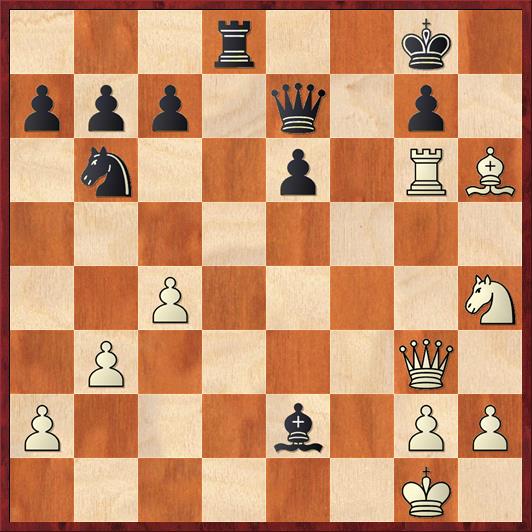In today’s playoff round of the World Cup, Jeffery Xiong became the only American player still standing. In a thrilling match, he beat Jan-Krzysztof Duda 4 1/2 – 3 1/2. White won seven out of eight games, so arguably it was the one game that Xiong managed to draw as Black (a Caro-Kann in the seventh game) which was the turning point.
However, it was the eighth-round game that was decisive. Duda played an Alekhine’s Defense as Black, a super-sharp choice that shows that he really wanted the match to end and not go to Armageddon.
After 24 moves, they reached the following position where Duda was teetering on a ledge above a bottomless abyss. But he can still save himself. Can you see how Black equalizes?

Here Duda played 24. … Rd1+??, and after 25. Kf2 Qf8+ 26. Nf3 he had to give away his bishop to avoid annihilation. After 26. … Rd7 27. Ke2 it was an easy win for Xiong.
Instead Black only had to play a tiny in-between move: 24. … Qc5+! to save the game. The point of this move is simply to force White to withdraw one of his attackers. Of course we can immediately rule out 25. Kh1 or 25. Qf2, after which 25. … Rd1+ is mate. So either 25. Be3 or 25. Qe3 are forced. In case of 25. Be3, Black can now play the same variation as in the game, but with the huge difference that the bishop is now on e3 rather than h6:
24. … Qc5+ 25. Be3 Rd1+ 26. Kf2 Qf8+! 27. Nf3 (White does not want to walk into 27. Kxe2?? Qf1 mate!) Bd3! (renewing the mate threat) 28. Bxb6 Bxg6 29. Qxg6 ab and now Xiong would have to bail out to a draw after 30. Qxe6+ Qf7 31. Qc8+.
In fact it is Xiong who is a little bit lucky to escape with a draw in the above variation. Safer for White is 24. … Qc5+ 25. Qe3 Qxe3 26. Bxe3. But Black has gotten out of the middlegame crucible and into an endgame where his active rook and bishop should give him very good drawing chances.
The spectators, with the computer evaluations in front of them, naturally wondered how Duda could have missed 24. … Qc5+. Well, just try playing this position and seeing all of the tricky nuances when you have 3 seconds a move. I personally find it very hard to spot zwischenzugs when playing blitz. I think that to conserve time there is a tendency to look just at the “logical” sequences of moves. Moving your queen to f8 via c5 is not obvious; it’s like Columbus sailing west to get east.
So maybe Xiong got a little bit lucky here, but he deserved to win. He put pressure on his opponent to find a miracle move, and his opponent couldn’t do it.
Now we’re on to the round of eight! The matchups (along with the original seedings) are as follows:
- #1 Ding Liren vs. #9 Alexander Grischuk
- #20 Nikita Vitiugov vs. #12 Yu Yangyi
- #31 Jeffery Xiong vs. #10 Teimour Radjabov
- #3 Maxime Vachier-Lagrave vs. #6 Levon Aronian


